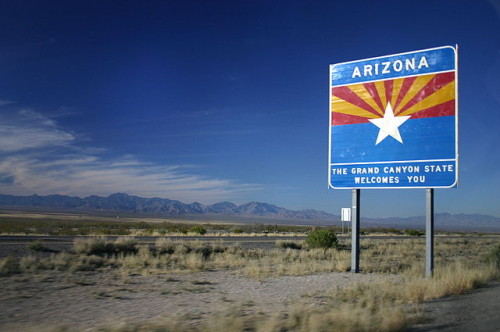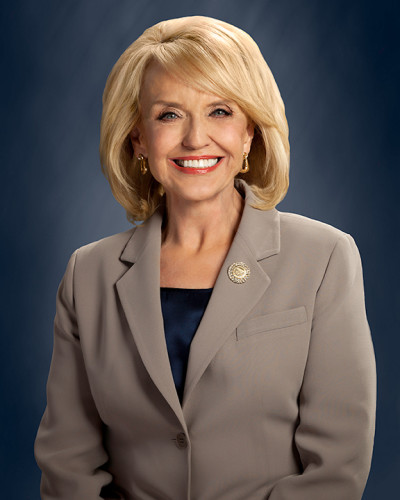After weeks of debate and protest, the show-down in the Copper State is finally over. Arizona Governor Jan Brewer vetoed State Bill 1062, the so-called anti-gay bill. With high stakes and increased pressure from corporations, Brewer had little choice but to object. On Feb. 26 she said:
I have not heard of one example in Arizona where business owners’ religious liberty has been violated … The bill is broadly worded, and could result in unintended and negative consequences. (The Washington Post)
While the notorious Arizona State bill is now certainly dead, the conversation is far from over.

Image: Wing-Chi Poon, CC lic. (Wikipedia Commons)
The mainstream media dubbed SB 1062 “anti-gay” legislation in order to link the bill to recent public discourse surrounding marriage equality. However SR 1062 was not specifically “anti-gay.” In fact SB 1062 was not even new legislation. It was a proposal to amend a current Arizona law – one that is commonly referred to as a Religious Freedom Restoration Act (RFRA.)
Mark Bailey, a Druid living in Phoenix, Arizona explains:
We took the time as a State to vote on the people that we felt would advance our beliefs and protect our rights from those who do not understand Arizona. Instead what we got was a few very unscrupulous people who decided instead to forward a small minority of people’s rights ahead of everyone else’s. They decided that it was okay to try to legalize an individual’s right to bigotry, prejudice and outright hatred.

Mark Bailey, Druid and Arizona resident
In April 2013 we reported on Kentucky’s passage of its own RFRA law after a series of disputes with its Amish community. Generally speaking, RFRA’s seek to protect the right to act or not to act based upon “sincerely held religious beliefs” when imposed upon by the government. This might include a public school test held on a holy day, a ban on beards or religious head wear, or a requirement to conduct legal business on the Sabbath.
At first glance the concept sounds great until you look a bit closer. Legislators have repeatedly recognized that the broad language of these type laws could potentially lead to abuse. Kentucky Senator Daryl Owen, “This is a piece of legislation looking for a reason.”
What changes did Arizona’s legislature make to its own RFRA that led to the recent uproar? SB 1062 expanded the RFRA language to include private industry. Here is a portion of the text from the revised law:
‘State action’ means any action by the government or the implementation or application of any law, including state and local laws, ordinances, rules, regulations and policies, whether statutory or otherwise, and whether the implementation or application is made or attempted to be made by the government or nongovernmental persons.

Arizona Governor Jan Brewer (official portrait)
SB 1062 replaced “government” with “state action.” The original (and current) Arizona RFRA only addresses burdens placed upon individuals by governmental agencies (e.g., the Amish buggy controversy, prayer in public schools.) The revised version would have included those burdens placed upon nongovernmental persons by nongovernmental persons when using a ‘law’ or ‘state action.’ This means that businesses could claim a defense under RFRA laws when they feel their “sincerely held religious beliefs” are being burdened. For example, this might include the subsidizing of birth control or the hiring or firing of certain individuals. Mark Bailey expressed his concern:
Companies have to designate themselves as “religiously affiliated employers” and can therefore by RFRA not be forced against their religious will to do something. Since the Bill was ambiguously written, it would have allowed wide varieties of actions to be potentially covered by this Bill … I saw the potential for this arrogance to be the beginning of a very dark time for just about anyone that someone in power thought was wrong for some reason.
While all the media attention was on Arizona, Kansas had been pushing its own revised RFRA with very specific language. It reads in part:
No individual or religious entity shall be required by any governmental entity to do any of the following, if it would be contrary to the sincerely held religious beliefs of the individual or religious entity regarding sex or gender …
While the Kansas bill has a very clear target, the Arizona law was far more open-ended and could have resulted in problems for many sectors of its population – not only the LBGTQ community. However, it is easy to see how SB 1062 quickly became a “gay issue.” Consider John C. Eastman’s, chairman of the National Organization for Marriage (NOM), reaction to the veto:
The fight has to be over what the First Amendment is … This is not somebody adhering to old Jim Crow lunch-counter discrimination. This is a fundamental dispute about what marriage means, and why it’s important for society.
Eastman’s comments demonstrate the underlying agenda of RFRA supporters.
In an on-air CNN debate with Cathi Herrod of The Center for Arizona Policy, Rob Boston of Americans United explains, “I really think that bills like this are the dying last gasp from people who just can’t accept the fact that American Society is changing.” He adds:
What legislation like this does is take a very noble concept like religious freedom and it turns it into a tool of oppression of other people and that is simply not right. That is a fundamentally anti-American value. It’s at odds with the First Amendment.
Last April Rev. Selena Fox, founder of Lady Liberty League and Circle Sanctuary, agreed saying:
Religious Freedom is an important foundation for the United States. We need to be vigilant, guard it, preserve it and uphold it. However, as part of this work, we also need to closely examine political crusades and legislation that are put forth in the name of “Religious Freedom.” Just because something is proclaimed to be about “Religious Freedom” does not make it so.
According to The Washington Post, there are currently nine states considering related RFRA legislation. As the Post says, “Here are the states to watch if you want to keep tabs on this issue:” Mississippi, Missouri, West Virginia, Oklahoma, Michigan, Idaho, Hawaii, North Carolina and Oregon. In West Virginia, there is even a proposal to amend the state constitution with specific religious language.
The same article also notes that six states have now abandoned attempts to push through or amend RFRA legislation. These include Tennessee, Utah, South Dakota, Ohio and Georgia. Kansas has even tabled its bill.

Image: Gonzo fan 2007, CC-BY-SA-3.0 lic. via Wikimedia Commons
Finally one more side point needs to be made with regards to the Arizona “kerfuffle.” During the weeks leading up to the veto, the NFL, the Arizona Cardinals Football Team, the 2015 Super Bowl Committee and Major League Baseball all came forward very quickly with strong statements against Arizona’s SB 1062 affirming their practice of diversity. These statements were expressed just as the multimillion dollar sports industry was faced with its own internal diversity challenge. Potential NFL draft pick Michael Sam announced he was gay. Conservative lobbyists now want Congress to legally ban gay players from the NFL and similar leagues. How will these national sports organizations react when confronting this issue in their own backyards?
The conversation is far from over.
The Wild Hunt is not responsible for links to external content.
To join a conversation on this post:
Visit our The Wild Hunt subreddit! Point your favorite browser to https://www.reddit.com/r/The_Wild_Hunt_News/, then click “JOIN”. Make sure to click the bell, too, to be notified of new articles posted to our subreddit.
Here’s the rub: there is a vast difference between practicing a religion and forcing the world-view of that religion on others (see Muslims, murdering schoolgirls.)
So your religion says gay sex is taboo. Fine, then you can’t have gay sex. You can’t marry a same-sex person. You get to loudly bark about how sinful gay sex is. But as the old saying goes, the right to swing your fist ends where my nose begins.
Example: I think unnecessary wars are immoral, and incompatible with my religious beliefs. But unlike anti-abortionists, I don’t get to carve out an exemption for my sincerely held belief. I still have to pay taxes, a large chunk of which goes to fund unnecessary wars and (among other atrocities) murder children. There is no “Hyde Amendment” to keep my tax money from paying the US military to kill people.
And those in power know what a king-sized can of worms this kind of thing would open. (I’m sure Brewer had it… explained… to her in great detail.) What happens when some Christian Identity group declares that their sincerely held religious tenet – that Jews and Blacks are “inferior races” – allows them to discriminate against these groups, and it runs headlong into the public accomodation clauses of the Civil Rights Act? Under that Arizona law, why would racial discrimination for religious reasons not be covered?
Believe me, had the law not been vetoed, that WOULD have come up eventually, and oh what a media circus that would be. And the business powers of the State, already sick to death of this nonsense, KNEW it would come up eventually.
I was wondering why none of the coverage I saw on MSNBC mentioned that the language of some of these proposed laws would make it perfectly legal not to serve Jews, or Mormons, or Sikhs, or whatever religious group you despise.
Speaking as a Mormon, it doesn’t bother me a bit. I’d rather know someone doesn’t like me and give my money to someone else.
A few months ago, a Quaker blogger wrote about this issue. She said that she thought the so-called religious conscience issue with the Affordable Care Act’s contraception mandate for Hobby Lobby and other companies didn’t make sense to her as a Quaker. Her co-religionists who objected to paying Federal taxes to support the military had a choice here — the ones who really objected to military spending earned an income too small to be taxed. In other words, they were able to follow their religious beliefs here regarding taxation and military spending but it required sacrifice on their part.
The owners of the Hobby Lobby do have an option that complies both the Affordable Care Act and their religiously-motivated consciences. One way to avoid the contraception mandate would be to get out of the Hobby Lobby business. But that would require making a real sacrifice for one’s religious beliefs.
“Religious freedom” was just a veneer. The law sought to repeal the Fourteenth Amendment and all norms of civil rights law within the borders of one state.
As Pagans, we can work to fight these sort of “religious freedom” laws. The majority of these laws are put forth by various fundamentalist Christian groups. However, they think that it only applies to Christian groups. Once they realize that any sort of “religious freedom” laws also applies to Pagans, they will most likely back down. We just have to be sure that we speak out, as Pagans, when these ‘religious freedom’ laws are being discussed in a public forum.
Even for non-Pagans, it’d be helpful to speak out when these bills are being discussed. Be sure to put it in the context that this means Christians can also be discriminated against due to their religion.
So many fundamentalists feel that just because society is getting more secular that Christians are facing some sort of persecution due to their beliefs. They want to be martyrs, like most religious people.
Spinning such “religious freedom” bills in that way will play in perfectly to Christian fears about “persecution” and they’ll back down. If they try another tactic, such as trying to enact legislation that only allows Christianity to be favored, they’ll be prevented by the establishment clause of the First Amendment.
Mind you, I am not in favor of any sort of anti-Christian behavior. Bigotry is bigotry…and I have very dear Christian friends that are staunch allies for LGBT people. Many are LGBT themselves. However, I will fight the individuals who feel their faith justifies them to codify bigotry into law.
This issue transcends our identity as pagans, I think. It goes to the core of what it means to be American. A half century ago, after nearly two centuries of soul-searching and bloody struggle, we came to a consensus that “we don’t serve your kind” is utterly un-American and inhumane. It is a “freedom” that is exercised solely at the cost of dignity of its victims.
In all the discussion of the Arizona ‘religious freedom laws’ and the eight others introduced in other states, few people add to the discussion the two cases now before the Supreme Court, Sebelius v. Hobby Lobby Stores and Conestoga Wood Specialties v. Sebelius. The private entities in both cases make similar legal theories to the Arizona law and an adverse decision in either would be catastrophic. There is a clearly a well funded development of legal theory here. These laws are not written by individual yahoos, but rather by high paid operatives at think tanks, while lawyers work hard to push forward an interesting legal theory to support the views.
“States’ rights” no longer works to enshrine local bigotry in law, so now they’re trying “religious freedom.” Same old s***.
UGGH what a terrible embarrassment. Now I support religious freedom for people of all religions, pagans included. But the man in the above picture…such people… what an embarassment! Claiming to be druids and wearing ridiculous and sometimes historically inaccurate medieval clothing… just how embarassing!
I prefer the “neither help nor hinder” bit.
If people choose to be bigots, let them. But no excusing them from the consequences either.
There are many people who I don’t want to associate with or do business with. This accommodation thing cuts both ways. If I owned a bookstore and someone came in and ordered fifty copies of The Turner Diaries, should I be required to sell that book? Should a kosher kitchen be required to cater a pork barbecue party? Should your taxes go to a Faith Based Initiative?
Under existing civil rights laws, nobody has to provide any good or service they don’t want to offer. What it does say is that whatever you do sell in the way of goods or service at a business open to the public must be available to everyone equally. You don’t have to sell the Turner Diaries, but if you do, you better not selectively refuse a sale to someone because they’re Jewish or LGBT etc.
Help me understand.
I can legally discriminate against a white racist, but a baker should not be legally allowed to discriminate against a homosexual couple?
So one group is special because they are the approved minority of the week? But if a group isn’t recognized by the Powers That Be, it’s okay to ignore them?
That seems more like privilege than freedom.